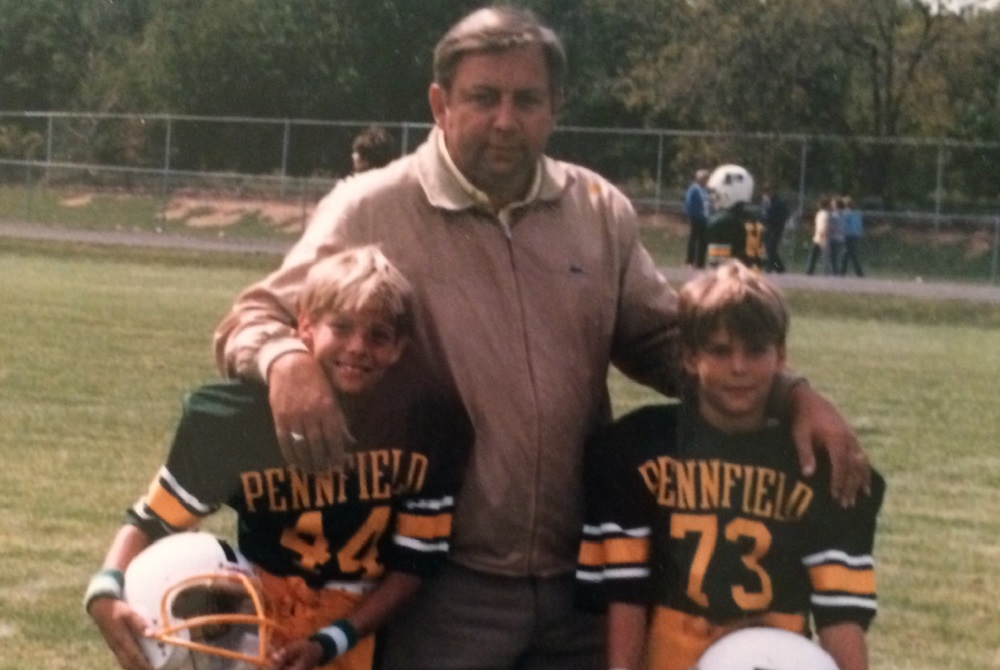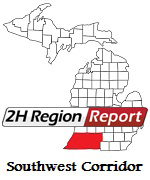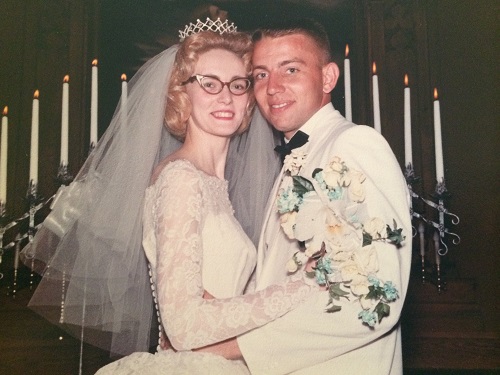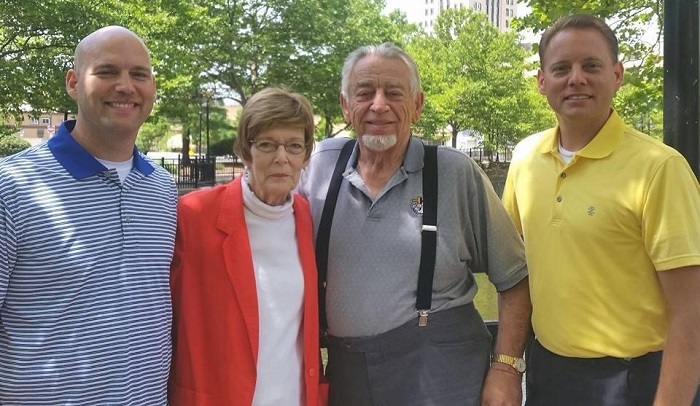
'Larger-Than-Life' Pennfield AD Admired for Statewide Service
By
Pam Shebest
Special for MHSAA.com
April 14, 2021
BATTLE CREEK — To many Battle Creek sports enthusiasts, Bernie Larson was known as “Mr. Pennfield.”
 But for two former athletes, twins Chris and Cam Larson, that was not the case.
But for two former athletes, twins Chris and Cam Larson, that was not the case.
“I never knew him or thought of him as Mr. Pennfield; he was Dad,” Chris said.
Larson, 78, who served as athletic director at Pennfield for 29 years, died March 14 after an extended illness.
A memorial service is being planned for May 15 at a time and place to be determined.
“A lot more remembrances come back when someone passes,” said Chris Larson, who lives in Virginia. “You hear so many stories from people who remember him, including former students and coaches.
“It’s great to hear the impact he had on so many people that you never knew about.”
Stories are plentiful when it comes to Bernie Larson.
“He was a heckuva golfer,” said Karen Leinaar, the current executive director of the Michigan Interscholastic Athletic Administrators Association (MIAAA) who during an early stop served as athletic director at Delton Kellogg, which with Pennfield for a time was part of the Kalamazoo Valley Association. “If you needed golf balls on the course, everyone said, ‘Just ask Bernie.’ He always had them.”
The reason?
“If he had one ball in his bag, he had 50 or 60 in his bag,” said Larry Wegener, former Battle Creek Central athletic director. “He had milk crates full of golf balls in his garage” that he found on the course or fished out of ponds.
Championship City
When Larson was named Pennfield’s athletic director in 1970, it became a family affair.
“I had no clue, no clue,” said Joni, Larson’s wife of 56 years. “We never trained to be wives of athletic directors. We learned the most from other wives.”
 She became involved in the job, selling tickets at home games. When their sons were old enough, they helped out with the field.
She became involved in the job, selling tickets at home games. When their sons were old enough, they helped out with the field.
“They knew where the flag was kept and how to play the national anthem. They learned how to keep score” and were active in playing sports, she recalled.
“Cam (who lives in Minnesota) played football, baseball and basketball,” Chris Larson said. “I played tennis, golf and basketball. We grew up playing little league baseball and football.”
One family favorite was the yearly athletic directors conference at Grand Traverse Resort.
“He was there for business; we kids were there for fun,” his son said. “As we got older, we went to the auditorium that was filled with booths with sports-related things.
“As a kid we went around and grabbed the swag. It was a kids of athletic directors thing.”
It was not all fun and games.
“Bernie Larson was instrumental putting Battle Creek on the map athletically,” Leinaar said. “Four of (the ADs), Bernie, Ralph Kenyon of Harper Creek, Glen Schulz of Lakeview and Larry Wegener of Central put on the tournaments and had crews of people every year right there helping.
“Their hard work and commitment to the MHSAA, running perfect tournaments, made Battle Creek a stop for athletics for many, many years. Many times, Bernie led the pack.”
In spite of his willingness to help others, there was a caveat, Leinaar said.
“He would say to me, ‘Karen, I’ll help you out however I can, but remember, Pennfield is going to win.’
“Pennfield joined the KVA in the late 1980s, so we saw each other quite a bit. Our football games were always barn burners as were track and field.”
 Wegener recalls those days full of tournaments and 65-hour work weeks.
Wegener recalls those days full of tournaments and 65-hour work weeks.
“We did so many MHSAA events, I think a lot of people thought we were on the staff,” he said.
Those tournaments included more than 50 state championships in baseball and softball, team and individual wrestling, volleyball and girls basketball.
Brett Steele, Pennfield’s current AD, said Larson “was still a strong presence in the athletic department and community as a whole even after he retired.
“Up until last winter, Bernie still helped out at football and basketball games as our officials host. He knew most of the officials in those sports and was a familiar face to many when they worked games at Pennfield.”
Larson had served as an MHSAA basketball and baseball official. He also helped found and is a member of the Pennfield Hall of Fame and coached both girls and boys golf.
He received the MHSAA’s Allen W. Bush Award in 1997, the MHSAA’s Charles Forsythe Award in 1999 and was the MIAAA State Athletic Director of the Year for 1991-92.
All About Family
In spite of the hours spent with his job, Larson was a good family man, Wegener said.
“He spoke highly of his kids,” he said. “Chris and Cam were the pride of his life. Joni was a real good fit for him.”
Wegener said Larson was a larger-than-life guy.
“If you were going to run a tournament and you brought a notebook full of stuff for your tournament, Bernie brought a briefcase.
“If you brought a briefcase, Bernie brought a suitcase. He just believed in being prepared for everything.”
One thing the athletic directors did a lot was frequent restaurants, and Larson had his favorites.
“Perkins whenever he traveled, the Pancake House every Sunday and the Irish Pub,” Chris Larson said.
A person could always spot Larson. He was with one with the napkin tucked over his shirt.
“He always wore a suit and tie and would use a napkin as a bib because he was always spilling something on his necktie,” Joni Larson said.
Another thing her husband was famous for was his jokes.
“He always had a favorite joke that I’d hear 27 times,” she said, laughing. “It was like he had a joke of the week, and everybody had to hear it.”
During summers, Larson taught driver’s education at the school, something Chris Larson remembers well.
 “I remember on the last day of driver’s ed, you drove for 45 minutes,” he said. “My brother and I and one other kid were in the car, and I drove to Lansing to the MHSAA and we sat in the parking lot while my dad went inside.
“I remember on the last day of driver’s ed, you drove for 45 minutes,” he said. “My brother and I and one other kid were in the car, and I drove to Lansing to the MHSAA and we sat in the parking lot while my dad went inside.
“I know the MHSAA through his eyes and through my own eyes.”
Larson’s love of sports transferred to his sons.
“We all share a love of golf and would play together any chance we got, but over the past years his health wouldn't allow him to play,” Chris Larson said. “I miss that very much.”
Another tradition is being carried on by his son, but it evolved in an unusual way.
The twins were a Christmas surprise for Bernie and Joni.
“They didn’t do ultrasounds routinely back then (1974) so we didn’t know,” Joni Larson said. “We had Bernie’s middle name, Leon, picked out as a first name,” Joni Larson said.
“When we found out there were twins, we gave Chris ‘Leon’ as his middle name and Cameron ‘Noel’ which is Leon backwards, so both had dad’s middle name.”
Chris Larson has continued the tradition, giving his oldest son, Joshua, Leon as a middle name.
Chris Larson echoed the thoughts of many who knew Mr. Pennfield as a people person.
“In my opinion, he was the most Christian man I knew. He lived a Christian life and he shared it with others,” Chris said.
“He was chaplain for some baseball and basketball teams. He knew somebody everywhere no matter where we went in the state.”
Chris Larson paid a special tribute to his father after the funeral.
“He had a parking spot in the circle of the old Pennfield High School right in front of his office,” he said. “His van was there all the time.
“One of the things I did after the funeral was just hang out there for a while.”
 Pam Shebest served as a sportswriter at the Kalamazoo Gazette from 1985-2009 after 11 years part-time with the Gazette while teaching French and English at White Pigeon High School. She can be reached at [email protected] with story ideas for Calhoun, Kalamazoo and Van Buren counties.
Pam Shebest served as a sportswriter at the Kalamazoo Gazette from 1985-2009 after 11 years part-time with the Gazette while teaching French and English at White Pigeon High School. She can be reached at [email protected] with story ideas for Calhoun, Kalamazoo and Van Buren counties.
PHOTOS: (Top) Longtime Pennfield athletic director Bernie Larson also raised his family in the district, with sons Chris (left) and Cam among those to wear the uniform. (2) Bernie and Joni Larson were married 56 years. (3) Among Larson’s longtime colleagues were former Delton Kellogg athletic director Karen Leinaar and retired Battle Creek Central athletic director Larry Wegener. (4) The Larson family, more recently, from left: Cam, Joni, Bernie and Chris. (Family photos courtesy of the Larson family; head shots by Pam Shebest.)

Making (Health) Histories Every Year
July 23, 2015
By Rob Kaminski
MHSAA benchmarks editor
Tom Minter, recently retired from the MHSAA as assistant director, wore many hats while serving the Association and donned official’s gear in numerous sports outside of business hours.
But one of his finest refereeing efforts might have come during the 2009-10 and 2010-11 school years when he guided approximately 60 individuals representing 25 medical and professional organizations through an arduous process to upgrade the antiquated Physical Form to what is the standard today: the Pre-participation Physical Examination/Health History Form.
The form highlighted Stage 1 of the MHSAA’s 4 Hs of Health and Safety – Health Histories – and the current form is much more comprehensive, answering questions previously not asked during the quicker, more brief, evaluations.
Sudden cardiac death claims the lives of more than 300 Michigan children and young adults between the ages of 1-39 years annually. Yet, many of these deaths could be prevented through screening, detection, and treatment. One such way to detect high risk conditions that predispose to SCDY is through pre-participation sports screening of student-athletes, and the current physical form provides a mechanism.
While much more detailed, schools report that parents are more than willing to take the extra time and effort to complete the lengthier version.
“When the expanded form came out, people kiddingly made comments about its length; yet in today's day and age everyone understands we need all the information we can cultivate regarding health histories of our student athletes,” said Mark Mattson, athletic director at Traverse City Central.
Down state, feelings have been similar. “We don’t have a problem at all here,” said Anna Devitt, athletic secretary at Hartland High School. “Our parents take care of it, and haven’t balked at the length at all.”
Both agree, and are joined by many others across the state, that the next logical step is for the form to be converted to a fillable, online document so that records can be accessed by those in need via mobile, laptop or desktop.
Thus, in the “No H left behind” mantra that the MHSAA has assumed, an electronic option of the Health History form is in the early planning stages.
“As an increasing number of our schools strive to be ‘paper-free,’ or at least as much so as possible, it is time to re-invent the delivery method for perhaps our most downloaded or distributed document,” MHSAA Executive Director Jack Roberts said. “Once again, as we move forward with our ‘Heart’ initiative for the coming school year, we are also intent on bringing other projects up to speed.”
The masses are certainly enthused.
“That would be heavenly. An online version that would prevent people from submitting the forms until all the required information was in place would be fantastic,” said Mattson, who has had to turn back, or hold out students while waiting for completed forms, whether at Marquette, Maple City Glen Lake, or his current post in Traverse City. “It’s always been the same; people move too quickly and overlook required fields. It would prevent two things: one, having to hold kids out while waiting for a signature, and two, prevent parents from having to drive in to the athletic office to sign or fill in that last field. We’d know we were getting a completed form.”
At Hartland, where athletic director Jason Reck created an online emergency contact form, a system is in place which allows coaches, administrators and trainers to share necessary data for all student-athletes in addition to the MHSAA forms.
“Our parents love the online emergency contact form, and we require them to fill it out every season, not just once a year,” Devitt said. “Sometimes an athlete gets injured during one season and the next season's coach wants to know about it.”
The information on the form is populated into an Excel spreadsheet which Reck, Devitt, the school trainer and all coaches can access. They can tailor the data by sport and pull it to their mobile devices.
“We’re trying to go completely paperless, and the MHSAA physical form would be another step,” Devitt said. “Our parents and doctor’s offices would love it.”

